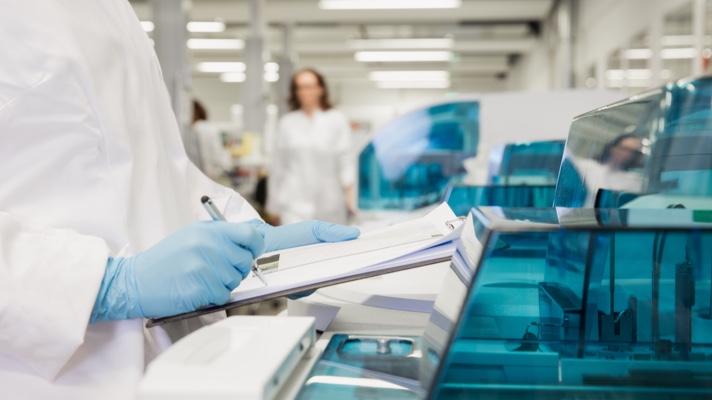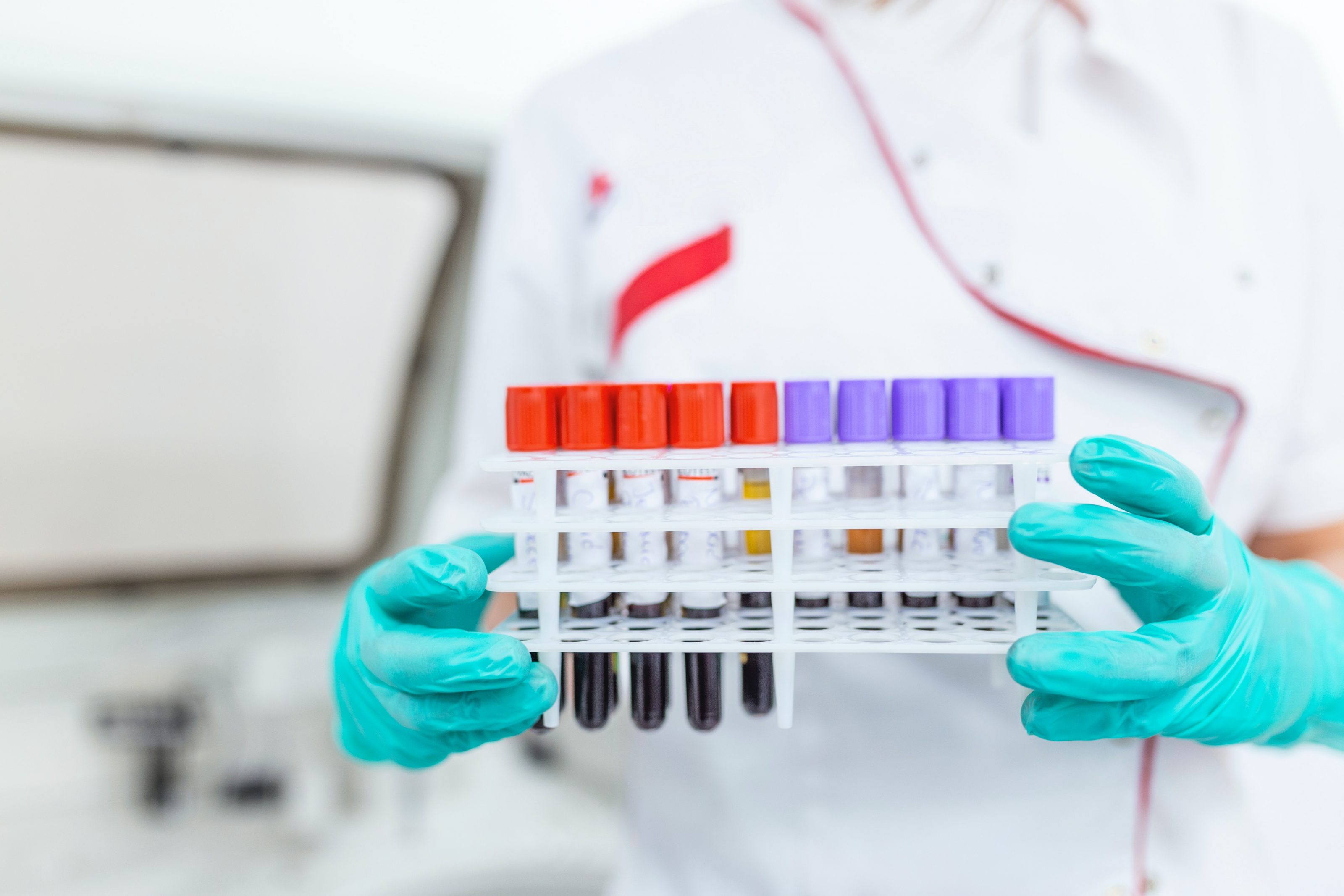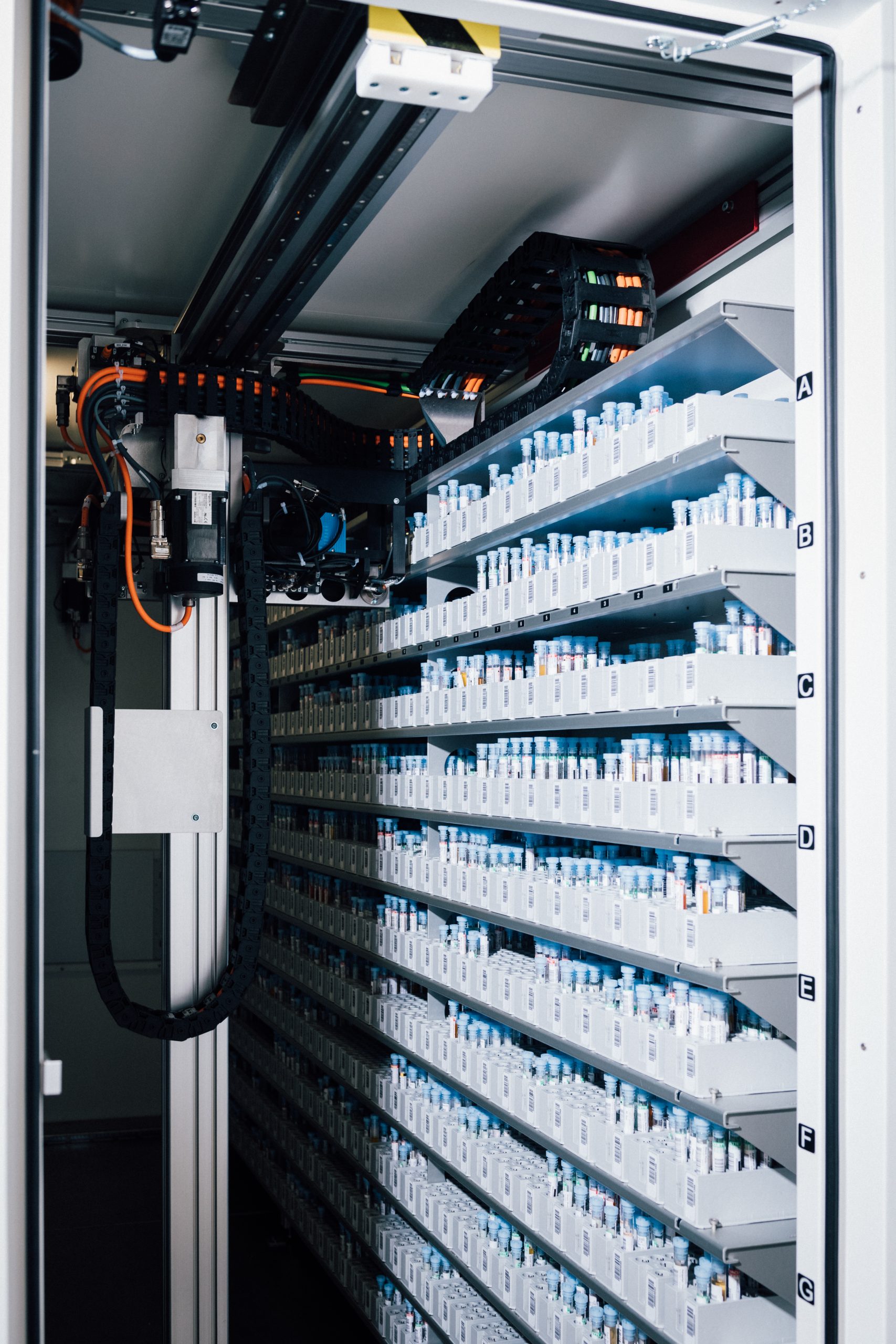Sample reception & Preanalytics
Avoid sources of error
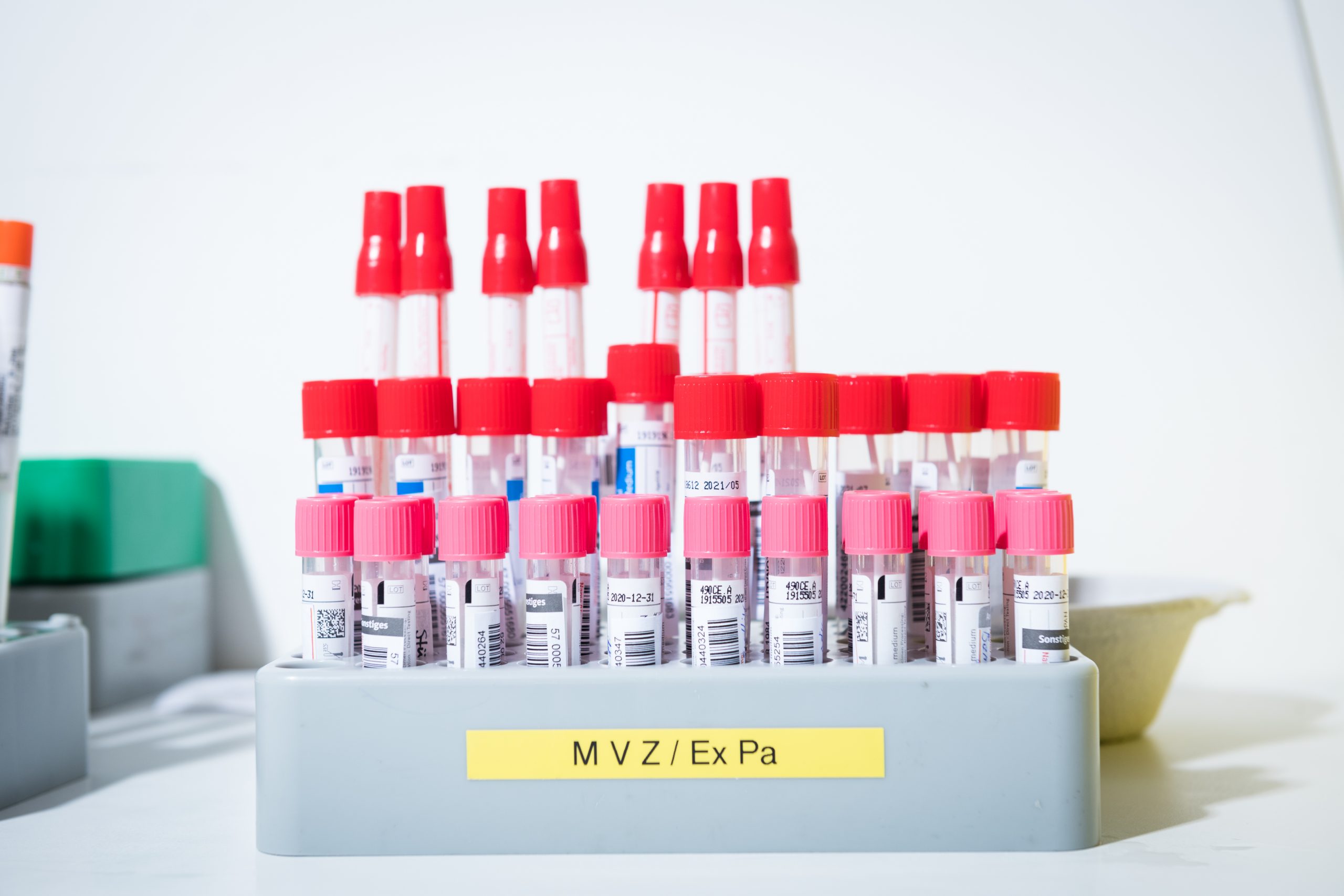
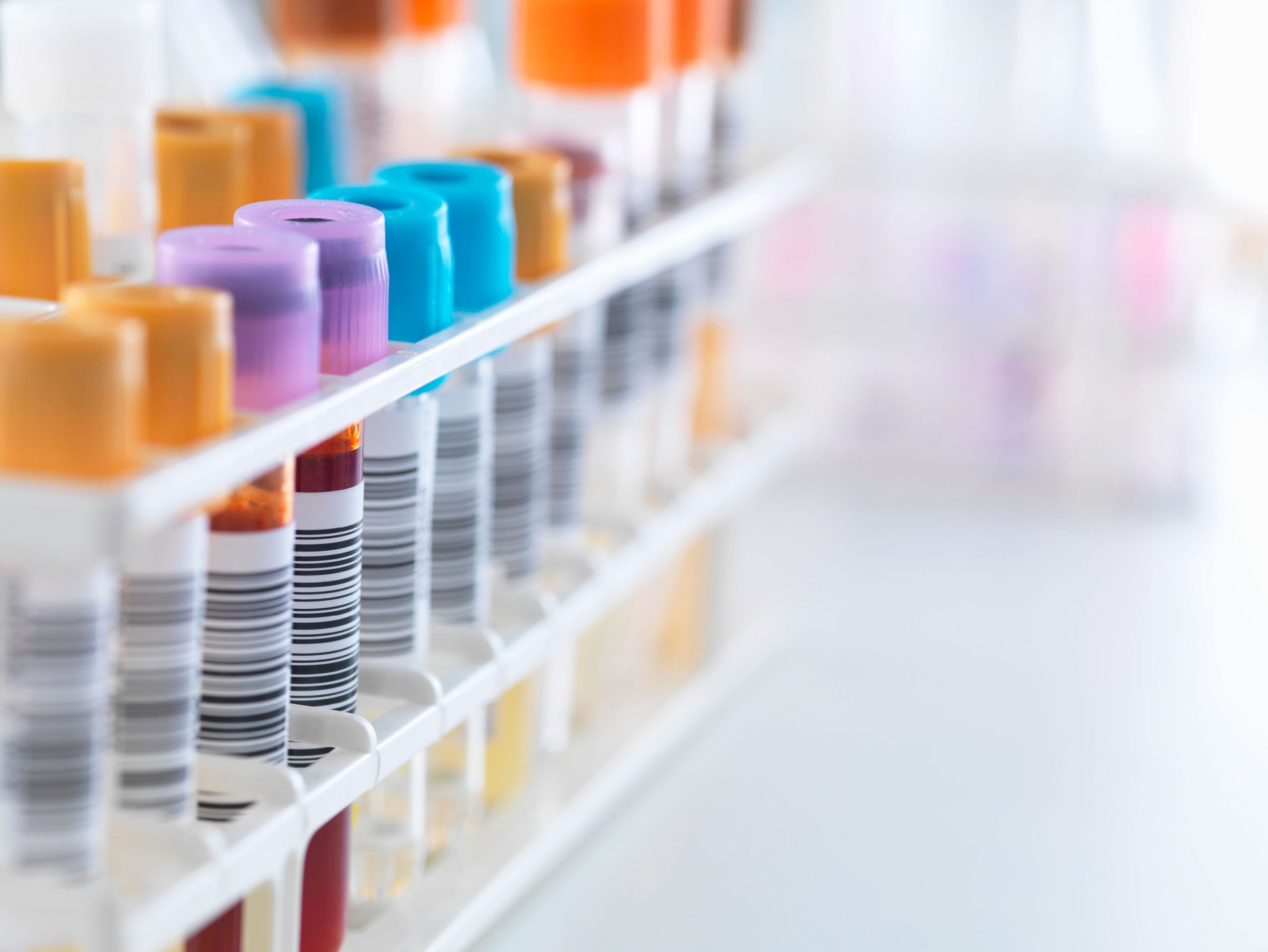
Central Sample Reception
Our pulse generator at the central laboratory operates one of the largest and most modern automation systems in the world. The central sample reception (CSR) is responsible for handling samples from receipt to archiving and disposal. Approximately 35,000 samples are processed daily at the Berlin laboratory. The management of the CSR is supported by the management of the individual departments.

The samples arrive at the CSR via various transport routes:
via pneumatic tube, box conveyor system, and couriers. This process is highly complex due to the enormous variety involved: we currently process 40 different types of tubes.
Preanalytics
The analysis of a sample can be divided into 4 phases: preanalytics, analytics, analytical evaluation and medical evaluation.
While analytics today is at a very reliable level, the so-called pre-analytical phase is one of the main sources of error in the creation and evaluation of data.
Pre-analysis is the phase of a test request that takes place before the actual laboratory analysis. The reliability of the laboratory results depends in many respects on this phase, as physical, chemical and physiological influences can affect the sample and change the parameter to be analysed, so that the measured value no longer reflects the in vivo conditions within the acceptable range. It is therefore important in principle to keep the time from sampling to analysis as short as possible. Furthermore, you should know the factors that influence the desired parameter. A distinction can be made here between influencing factors and disruptive factors.
What needs to be considered when taking samples? Where do I send the laboratory samples? Which forms do I need?
These and other questions relating to sample collection are addressed below.
If you require further information, please do not hesitate to contact us. The contact details for the individual departments can be found under Departments.
Preanalytics general information
-
In principle, the request for laboratory analyses has the character of a doctor’s prescription and must therefore be documented in writing or electronically. The requesting physician is responsible for ensuring that the examination is necessary and beneficial for the patient.
For reasons of data protection, only as much personal data is collected as is appropriate and relevant for the purpose in question. Regardless of whether it is submitted electronically or on paper, the request for investigation should contain all the necessary master data. The patient’s master data for identification purposes includes at least the following information: Surname, first name, gender and date of birth.
In addition to the patient-specific data, the following sender information must also be available:
- clinic,
- Station or department,
- Date and time of collection
- In individual cases, it is necessary to provide the laboratory with information on clinical data. Free fields are available for entering the diagnosis, question or indication.
Examples of other important information are:
- Blood gas analyses: body temperature;
- Hormonanalytik: der Zyklustag, die Schwangerschaftswoche;
- Blood group serology: immunoprophylaxis, pregnancies, medication;
- Therapeutic drug monitoring: body size, body weight, dose, time of last dose;
- Toxicology: patient’s condition, clinical findings, therapy started including medication given, suspected substance based on findings or clinical symptoms;
- Stimulation function tests: time before and after administration.
To enable the electronically readable request form to be read in correctly, please:
- handwritten entries only in the fields provided for this purpose.
- not to fold or crease the order form.
- Carefully stick the barcode labels in the spaces provided.
- Applications for examinations for our specialist areas are available under Forms / Download.
Our staff will be happy to talk to you and advise you. Referral slips must also be stamped and signed by the doctor. The EBM guidelines also apply. In the case of private patients and IGEL examinations, the full postal address must be given for the delivery of invoices.
-
When the order is created, the urgency (emergency or routine request) is assigned at the same time.
In general, care should be taken to ensure that emergency and routine requests are made in separate orders. Mixing both urgencies leads to considerable delays in the emergency analyses and should therefore be avoided.
-
The available range of analyses and detailed information can be found in our list of services.
Analytes that are not part of the bill of quantities can be sent by us at any time.
Please clarify information on acceptance or transportation conditions directly with the laboratory in advance.
-
For the performance of a molecular diagnostic or chromosomal test, a declaration of consent from the patient or their legal representative must be enclosed with the test request. Entsprechende Vordrucke befinden sich auf unserer Homepage unter Service/Formulare zum Downloaden.
-
Intranet Charité: medical service/laboratory/information page on the parameters and reference values/remote dispatch
Intranet Vivantes: Materials/Organizational Manual/Regulations/Medicine/Laboratory Berlin or Forms/Medicine/Laboratory Berlin
The site manager of the central laboratory/head of diagnostics/duty manager decides on the application.
-
Parameters that are not offered and performed by Labor Berlin are routinely sent to a third-party laboratory.
The dispatch of your sample material is documented in the laboratory with date/time and processor in a traceable manner.
You can contact us at any time if you have any questions about shipping.
Subcontracted analyses are marked in the specifications and on the findings.
-
The subcontractors are selected according to defined quality criteria and their services are regularly reviewed. The criteria include:
- Proof of quality
- Proof of successful participation in interlaboratory comparisons in the previous year for the intended external determination
- Copy of the certificate or accreditation certificate of the third-party laboratory
- Location of the external laboratory
- Quick accessibility
- Economical transportation
- Price/performance ratio for the intended external destination
- Rapid availability of findings (processing time, dedicated line possible)
- Willingness to advise clinicians (interpretation of findings)
The laboratories with which corresponding cooperation agreements have been concluded and the test procedures assigned to them are listed. In principle, the subcontractor undertakes to maintain confidentiality and to comply with the provisions on data protection.
The current subcontractors can be enquired about in the laboratory on request.
-
If your order is incomplete, our staff will inform you by telephone. If no clarification is provided within one shift, you will receive a written notification to inform you of any missing information in your submission.
Please note this information, as we will only keep your sample as “unexplained” for a limited time (depending on the sample).
The laboratory reserves the right to reject samples for which no clear identity is assured.
If the test material cannot be clearly assigned to a patient, but the test material cannot be recovered or was obtained when the patient was in a critical condition, a decision will be made in the laboratory after consultation with the sender as to whether the requested tests will nevertheless be carried out. The result of the consultation must be documented in the findings.
Other reasons for refusal may be:
- Sample-related: Sample too old, haemolytic, clotted, incorrect or too little material, incorrect mixing ratio for citrated blood;
- Related to transport: Transport conditions incorrect, sample not suitable for transport, tube broken;
- Related to the analysis (analyses from sample material deviating from the specifications, exceeding the time limit for subsequent notification for certain analytes);
- HIV diagnostics: No follow-up requests for HIV tests from material sent in for other analyses will be accepted. New sample material must generally be sent in;
- There is no declaration of consent for genetic diagnostic requirements.
-
Sample storage and stability are complex areas on which external influences (e.g. temperature, reagents, sample containers, stabilisers, light etc.) or short half-lives of an analyte (e.g. increase in homocysteine values or decrease in glucose values) have a decisive influence.
The resulting distortions can be considerable and lead to misdiagnoses.
This results in the following information:
- Send samples to the laboratory as quickly as possible, note transport times;
- Store samples in a dark place at room temperature until further transport. Avoid large temperature fluctuations;
- Transport samples in an upright position;
- Please observe pre-analytical instructions, e.g. homocysteine tests should be sent to the laboratory chilled immediately, as the sample must be centrifuged immediately!
- Transport blood culture bottles in a break-proof manner by using shipping tubes.
A contracted transport service ensures the professional transport of the test samples to the individual laboratories by arrangement.
The duration of the sample transport is documented and evaluated at regular intervals.
All samples are categorised as “biological substances of category B” and are generally considered infectious. The applicable regulations (including packaging instructions/P650) for packaging and labelling are derived from this:
- The sample (primary vessel).
- Secure and practical secondary packaging (e.g. shipping tube or tear-resistant film bag) with absorbent material.
- A sturdy outer packaging (e.g. plastic box, transport box or shipping bag).
- It is also possible to send in test samples by post. The additional terms and conditions of Deutsche Post AG apply.
Not authorised for dispatch by post:
- Infectious substances of any kind of category A (e.g. Lassa)
- Patient samples and microbiological cultures of category B,
- Risk group 3 (HIV, hepatitis, TB, etc.)
-
If samples have to be transported frozen, it is advisable to pre-freeze the transport containers. To do this, freeze the shipping containers in the freezer (approx. -20°C). To avoid loss of quality, the sample must be completely frozen before despatch. Place the frozen sample in the frozen transport container immediately before transport.
The transport container is then placed in a polystyrene container for transport to protect it from temperature loss.
-
Transport-related pre-analytical effects on the test results can be minimised under certain conditions. The sample tubes must be fixed in the cartridge with a foam stopper to ensure gentle pneumatic tube transport.
If samples are sent unpadded, this can lead to clinically relevant falsification of the results. Particularly affected are potassium, phosphate, NSE, LDH and blood counts (thrombocytes).
The following are generally excluded from transport by pneumatic tube:
- Liquor
- Citrated plasma for special coagulation
- Platelet function tests
- Blood cultures
- Neurosurgical biopsies
- Samples for cytological examinations (e.g. bronchial lavage)
- Non-liquid-tight sample containers
